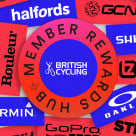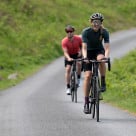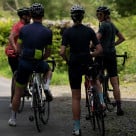Photos and Video:
Around 350 aspiring young volunteer coaches, officials and athletes were put through their paces at the Youth Sport Trust National Talent Camp at Loughborough University in December. Ceri Jones, a young volunteer coach at Port Talbot Wheelers shares her experiences of the four day camp, and why she loves volunteering at her local cycling club.
As a member of Port Talbot Wheelers, I received a lot of help from other people in the club, coaches and volunteers, so I wanted to give something back and help others in return. I was too young to do a coaching course so I decided to join the Cycling Award for Young Volunteers Scheme. As part of this scheme I have assisted the club coaches and the best part is watching the athletes improve. I am currently at gold level in the Young Volunteer’s Scheme and I’m working towards platinum. The Youth Sport Trust National Talent Camp was a brilliant opportunity to help to develop my coaching skills and to develop key skills that are needed for life.
Day one
At the camp in Loughborough University we were given a bag with 4 different coloured t-shirts, a hoodie and a water bottle. We changed into the blue t-shirt (Dream) and our hoodie and joined our National Governing Body (NGB).
At the opening ceremony the importance of having a dream was discussed, as without a dream you have nothing to strive towards. Katarina Johnson-Thomson, heptathlete, and Hannah Cockroft MBE, Paralympic wheelchair athlete, told us about their dreams to win gold in the 2016 Olympic Games in Rio. It was stressed that a dream was something to strive towards but not all people were going to achieve their dream. It was the journey to achieving the dream that was the most important thing.
After the opening ceremony had finished we split into our working groups. My group comprised people from five different national governing bodies who were all coaches. In the first session we learnt about the importance of having a philosophy as a coach. It is also important that the athletes we coach know about the philosophy because it creates clear boundaries for the athletes.
We then discussed what athletes, coaches and officials expected of each other in our NGB group. This gave us a chance to learn what the officials and athletes didn’t like about the way coaches sometimes acted.
Day two
The day began with morning circuits before breakfast. We then wore our pink t-shirts (Develop) and discussed honesty and ethics within sport. In this we were given scenarios and we had to decide what we would do as coaches.
After lunch we discussed the importance of having seasonal plans. These plans should take many things into consideration; what each of your athletes need to work on, what space you have to coach in, what competitions are coming up and other things that may affect your coaching sessions. This highlighted the importance of assessing each athlete individually.
We watched the Loughborough University Basketball team train and watched the three coaches taking an active role. This was followed by a basketball match where we observed players, coaches and officials. At the end of the match we discussed their roles and actions during the match.
In our NGB groups we discussed a scenario of the disqualification of an athlete after inappropriate conduct, and how the situation could have been improved if coach, athlete and officials had acted differently.
Day three
In the first session of another pink t-shirt day, we learnt about the chimp inside us and how it can be controlled. This was followed by a discussion on how we can portray ourselves positively on social media. This session was led by a basketball coach and a Premier League referee.
We examined how professional athletes portrayed themselves on social media, and received some pointers on the correct use of grammar to give correct meaning to messages.
The next session looked at where we should think before we act to avoid making mistakes as athletes, coaches or officials. The England Hockey coach spoke from experience of incidents.
Day four
More circuits before breakfast on a yellow t-shirt (Deliver) day. We discussed what we had learned so far and how we were going to change our ways of coaching as a result. In small groups we delivered a presentation on what we had learned. I would develop a coaching code of conduct with my athletes and let them know my coaching philosophy.
We also looked at what we would like to achieve after the camp. I would like to gain my Level 1 Award for Coaching Cycling and do more coaching. In addition, and when I am old enough I intend to progress to the Level 2 Certificate in Coaching Cycling. This will help me to improve my coaching skills and increase my knowledge.
If you are interested in becoming a young volunteer, helping out at cycling events in Wales please contact Alistair Waldron Alistair.waldron@welshcycling.co.uk For more information on the Cycling Award for Young Volunteers click here.




